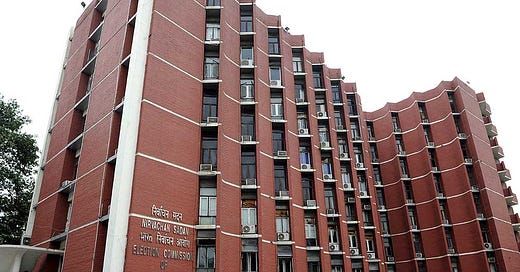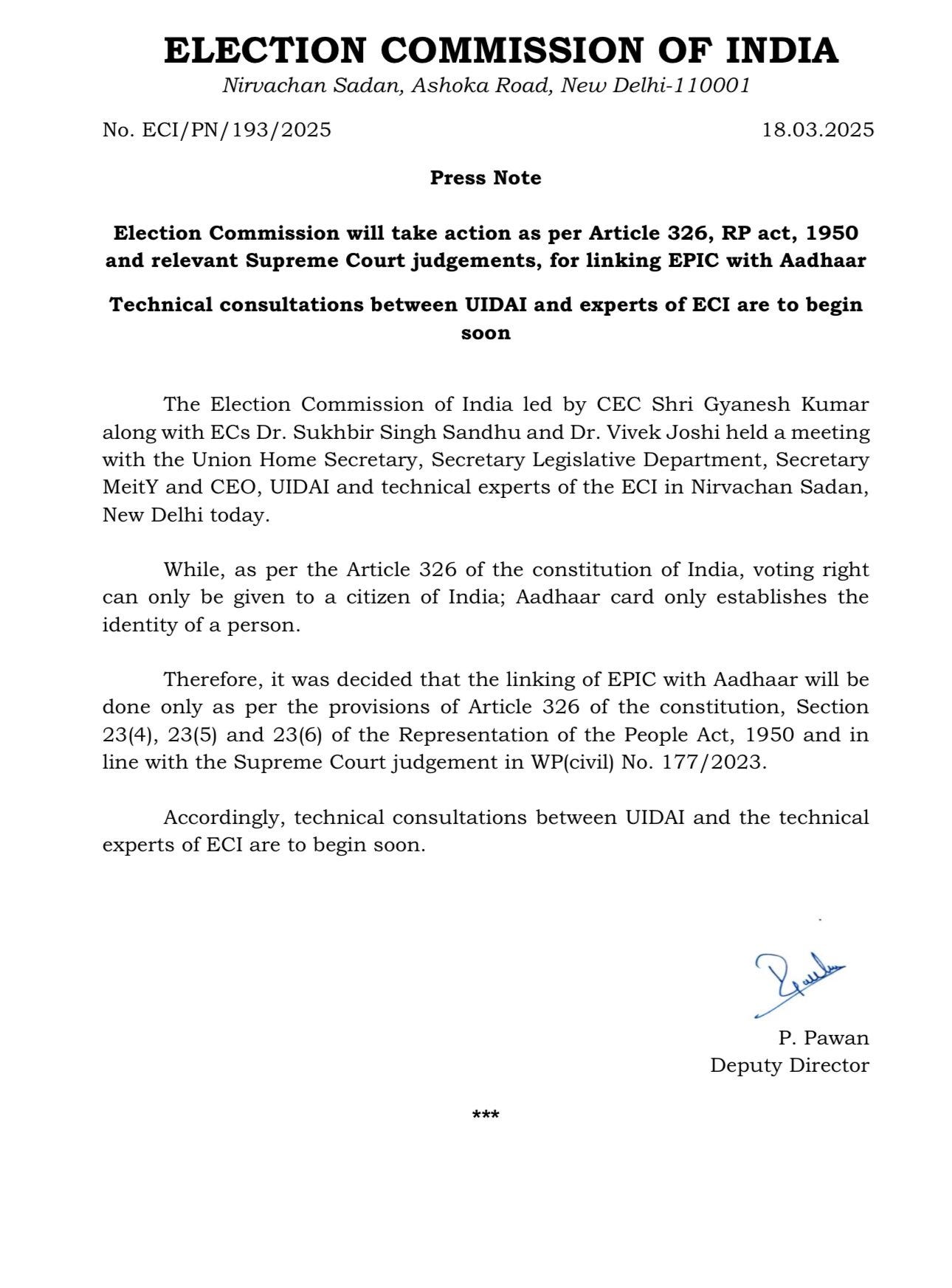Election Commission Finally Wakes Up to 'One Person-Multiple Votes' Conundrum
ECI's decisive move today, following its recent acknowledgment of duplicate voter ID issues and its commitment to addressing them through Aadhaar linkage, marks a significant first step.
“One Citizen-One Vote-One Country”: Need of the Hour
The Election Commission of India (ECI) has finally acknowledged a critical flaw in the electoral system: voter identification numbers are not unique nationwide and can be duplicated across states. This systemic loophole has long raised concerns about the potential for individuals to exploit it by registering and voting multiple times, whether in the same or different constituencies. The Commission’s admission comes amid mounting scrutiny over electoral roll integrity, and today, it has taken its first tangible step toward addressing this issue through Aadhaar linkage. While this marks a positive shift toward electoral reform, it also underscores the deep-seated vulnerabilities that have plagued India's voting infrastructure for years.
"The KBS Chronicle" had previously published two articles highlighting this very concern—"Linking Voter Lists to AADHAAR: For Transparent Elections and Fortifying Democracy" (July 5, 2023) and "One Citizen-One Vote-One Country: Need of the Hour" (March 2, 2024)—both of which I had personally forwarded to the then Chief Election Commissioner and other Election Commissioners. Whether our recommendations played a role in shaping this decision is beside the point; what matters is that the much-needed corrective action has finally begun.
The Revelation of Duplicate Voter IDs: A Democratic Vulnerability
On March 2, 2025, the Election Commission issued a clarification acknowledging that voters in different states could have identical EPIC (Elector's Photo Identity Card) numbers. According to the Commission, this duplication stemmed from a "decentralized and manual mechanism," where different states had historically used "identical alphanumeric series" before the electoral roll database was migrated to the ERONET platform.
While the ECI maintained that voters can only cast their ballots at designated polling stations regardless of EPIC duplication, its explanation failed to address a crucial concern—how the system prevents individuals from registering and voting in multiple locations, especially when general elections are conducted in multiple phases over nearly two months. This revelation reaffirmed what electoral reform advocates have long suspected: India's electoral system lacks a watertight mechanism to prevent multiple registrations across state boundaries—or even within the same state or constituency.
Recent Controversies Highlighting Electoral Roll Discrepancies
The issue of electoral roll integrity gained national attention following allegations of unusual voter increases in recent elections. In Maharashtra, Congress leader Rahul Gandhi questioned the addition of approximately 48.8 lakh voters between the April 2024 Lok Sabha elections and the November 2024 Assembly polls – more than were added in the previous five years according to his claims. The Election Commission countered these allegations, noting that 26.4 lakh of these additions were new and young voters in the 18-29 age group.
Similarly, in Delhi, former Chief Minister Arvind Kejriwal alleged voter list tampering, claiming over 5,000 voter names were deleted and 7,500 "fake names" added in just 15 days in the New Delhi constituency. Meanwhile, Delhi's electoral officials reported receiving over 5.1 lakh voter registration applications after December 15, 2024, with an additional 1.7 lakh forms submitted after the deadline, raising suspicions about the timing coinciding with announced welfare schemes.
ECI's March 2025 Action Plan: Legal Framework and Technical Implementation
Today, on March 18, 2025, the Election Commission issued a significant press note (No. ECI/PN/193/2025) announcing initiation of decisive action to address this contentious issue by linking EPIC with Aadhaar. The press note states that technical consultations between UIDAI and ECI experts will begin soon, following a high-level meeting between the Commission led by CEC Shri Gyanesh Kumar and key Central Government officials including the Union Home Secretary and CEO of UIDAI.
The ECI's approach is grounded in several legal provisions. Article 326 of the Constitution establishes that voting rights, based on universal suffrage, can only be given to citizens of India – a critical distinction since Aadhaar merely establishes identity, not citizenship. The linking process will adhere to Sections 23(4), 23(5), and 23(6) of the Representation of the People Act, 1950, which provide the statutory framework for maintaining electoral rolls. Additionally, the process will follow guidelines established in the Supreme Court judgment in WP(Civil) No. 177/2023, which likely sets parameters for protecting voter privacy while enabling authentication.
The Persistent Challenge of Multiple Registrations Across States
The issue of duplicate or multiple voter registrations has been particularly problematic in states with significant migrant populations. In industrial districts of Punjab like Ludhiana and Jalandhar, migrant laborers from Uttar Pradesh, Bihar, West Bengal, and Odisha often maintain voter registrations both in Punjab and their home states. The current system's fragmentation enables these "privileged voters" to potentially cast ballots in multiple locations during multi-phased elections.
This problem is compounded by inconsistent application of voter registration standards across states. While some states like Rajasthan and Himachal Pradesh impose stringent requirements for new voter registration, including proof of continuous residence and cancellation of previous registrations, these practices are not uniformly implemented nationwide. The lack of a centralized verification system has allowed these discrepancies to persist, undermining the fundamental democratic principle of "one citizen, one vote."
Benefits of Aadhaar-Voter ID Linkage: A Path to Electoral Integrity
Linking voter lists to Aadhaar offers several tangible benefits for strengthening electoral integrity. Aadhaar's biometric verification system can help identify and eliminate duplicate registrations, preventing individuals from voting multiple times in different constituencies. This integration would be particularly effective at preventing impersonation voting, where ballots are cast on behalf of deceased, absent, or fictitious voters.
The virtually universal nature of Aadhaar, which citizens can obtain from infancy, provides ample time for acquisition well before reaching voting age. This widespread adoption creates a practical foundation for voter verification without imposing new documentation requirements on citizens. A unified national voter database linked to Aadhaar would significantly enhance the transparency and credibility of the electoral system while reducing administrative burdens on election officials.

Addressing Privacy Concerns While Ensuring Electoral Integrity
Privacy advocates have raised legitimate concerns about linking Aadhaar with voter IDs, particularly regarding potential data misuse. These concerns require serious consideration and robust safeguards. Implementing strong data protection laws and technical measures to prevent unauthorized access to sensitive voter information is essential. Public awareness campaigns can educate citizens about their rights and how their information will be used and protected.
However, these privacy considerations must be balanced against the fundamental importance of electoral integrity. In an era where Aadhaar linkage is already required for numerous civic and financial activities, from opening bank accounts to filing income tax returns, the argument against using it to verify voter registration and identification becomes increasingly difficult to justify. The key is ensuring that implementation includes appropriate safeguards while still achieving the core objective of preventing duplicate, even multiple, voting.
Implementation Challenges and Practical Solutions
The integration of voter lists with Aadhaar faces several implementation challenges. First, it is important to recognize that Aadhaar establishes identity but not citizenship, which is a prerequisite for voting rights. Therefore, mechanical reliance on Aadhaar alone for voter registration must be avoided, particularly in border states with significant concerns about illegal immigration.
Logistical challenges can be minimized by leveraging the overlapping responsibilities of officials who already handle both Aadhaar and voter registration processes. Additionally, aligning electoral rolls for Panchayati Raj Institutions and Urban Local Bodies with the ECI's Aadhaar-linked voter lists would reduce inefficiency and confusion in the electoral system, especially in the context of Government’s ambitious proposal of “One-Nation, One-Election”.
The Election Commission's proposal to begin technical consultations between UIDAI and ECI experts represents a pragmatic first step toward addressing these implementation challenges. By focusing initially on the technical feasibility and security protocols, the Commission can establish a solid foundation before moving to broader implementation.
A Way Forward: Collaborative Action for Democratic Strengthening
Successful integration of Aadhaar with voter lists requires collaboration among multiple stakeholders. The Election Commission, central and state governments, political parties, civil society organizations, and citizens all have important roles to play in this process. A phased implementation approach would be prudent, beginning with new voter registrations for citizens turning 18 and gradually expanding to include the entire electoral roll.
The "peacetime" period between major elections offers an ideal window for methodical implementation without the pressures of imminent electoral deadlines. This approach would allow for thorough testing, refinement of processes, and addressing of any issues that arise before the system is deployed at full scale.
Conclusion: Better Late Than Never for Electoral Reform
The Election Commission’s decisive move today, following its recent acknowledgment of duplicate voter ID issues and its commitment to addressing them through Aadhaar linkage, marks a significant—albeit overdue—step toward strengthening India’s electoral integrity. While concerns about implementation and privacy must be addressed with due diligence, the core principle of "one citizen, one vote, one nation" remains fundamental to ensuring a fair and transparent democracy.
As the world's largest democracy, India has a responsibility to ensure that its electoral processes meet the highest standards of integrity and transparency. The initiative to link voter lists with Aadhaar, if implemented with appropriate safeguards, offers a practical solution to longstanding challenges of duplicate registrations and potential multiple voting. Though this reform has been long overdue, it is better late than never to strengthen the foundations of our democratic system. The citizens of India deserve nothing less than elections where each voice counts equally – once and only once.






Good decision by election commission